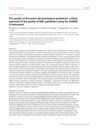Autoimmune Disorders Associated with Type 1 Diabetes: Clinical Overview and Principles of Management
December 2023
in “
Paediatrics & Family Medicine/Pediatria & Medycyna Rodzinna
”

TLDR Type 1 diabetes patients often have other autoimmune diseases, which complicate their care.
Type 1 diabetes mellitus is an autoimmune disease where patients develop antibodies against pancreatic islet β-cells, leading to insulin production loss. Up to 29% of these patients also have another autoimmune disorder, such as autoimmune thyroid disease, coeliac disease, autoimmune gastritis, pernicious anaemia, and vitiligo. Other possible coexisting conditions include rheumatoid arthritis, autoimmune hepatitis, alopecia, and psoriasis. The risk of developing additional autoimmune diseases increases with age and is higher in females. These concomitant diseases can worsen the quality of life and metabolic control in diabetes patients, increasing the risk of complications. Identifying organ-specific antibodies is crucial for early detection and management of these autoimmune disorders in type 1 diabetes patients. The article reviews recent research on the screening, diagnosis, and treatment of these associated autoimmune conditions.






